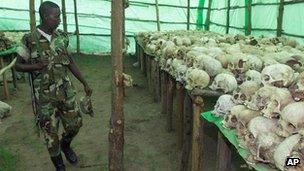Rwanda genocide: Kagame 'cleared of Habyarimana crash'
- Published

Around 800,000 Tutsis and moderate Hutus were killed in Rwanda in 1994
A report has appeared to clear Rwanda's President Paul Kagame of orchestrating the 1994 assassination of the country's then-leader Juvenal Habyarimana.
The team - mandated by a French inquiry - visited the scene of the attack to work out the trajectory of the missile which shot down his plane.
The crash was one of the triggers that sparked the genocide.
An earlier French probe blamed Mr Kagame and his allies, but they say Hutu extremists killed Habyarimana.
Rwanda's government has welcomed, external the conclusions of this new report.
The plane crash on 6 April 1994 - in which Habyarimana and Burundi's leader died - triggered the genocide of 800,000 Tutsis and moderate Hutus in just 100 days.
The killings came to an end when the Tutsi-led Rwandan Patriot Front (RPF) rebel movement, headed by Mr Kagame, captured Rwanda's capital, Kigali.
Elite presidential troops
Correspondents say the court on Tuesday concluded that the missile was shot from a distance of up to 1km (more than half a mile) away from the plane, which was about to land at Kigali airport.
At the time this area was held by the Rwandan army - a unit of elite presidential troops.
The experts say it would be very difficult for forces loyal to Mr Kagame to be in this area and therefore shoot down the plane.
They concluded that it would have been much easier for Habyarimana's troops or French troops who were in the area to launch the missile.
In 2006, a French judge accused Mr Kagame and his allies of killing Habyarimana - an allegation he dismissed as "ridiculous" and which prompted him to break off relations with Paris for three years.
Five years later, in 2011, a former senior ally of the president Theogene Rudasingwa - the RPF's secretary general and a major at the time of the genocide - also accused Mr Kagame. Mr Rudasingwa fell out with the president and now lives in exile in the US.
Mr Kagame has always insisted that Hutu hardliners - who considered Habyarimana too moderate - shot down the plane and blamed the RPF to provide a pretext for carrying out the premeditated slaughter.
Critics of the 2006 investigation said it failed to visit the area of the attack, or interview the nine high-ranking RPF officers it accused of involvement. It said the missile was shot from a distance of four kilometres away from the airport.
French judge Marc Trevidic headed this latest French inquiry, launched - with the full co-operation of the Rwandan authorities - towards the end of 2010 because the French crew of the plane also died.
The team has interviewed six of those accused in the 2006 report and conducted a forensic investigation. Two missiles specialists, two air accident experts, a pilot, two surveyors and a sound expert have reconstructed the sequence of the attack.
'Unhappy'
Following this report, Judge Trevidic can either drop the affair or continue his investigations, which could result in a court case.
"Today's findings constitute vindication for Rwanda's long-held position on the circumstances surrounding events of April 1994," Rwanda's Foreign Minister Louise Mushikiwabo said in a statement.
The lawyer for the Habyarimana family said they are unhappy about the report's conclusions - questioning the credibility of the experts - and they still want someone to be found guilty.
"It does not matter where the shooting took place," Habyarimana's son Jean-Luc told the BBC's Great Lakes service.
"What matters is who fired the missile," he said.
Habyarimana's widow, Agathe, told the BBC that she wanted the French inquiry to find out who had bought the allegedly Russian missile that hit the plane - because that would help to identify those behind the attack.
Rwanda has historically been beset by ethnic tension. It worsened under Belgian colonial rule when the Tutsi minority enjoyed better jobs and better education than the Hutu majority.
At independence, following inter-ethnic violence, many thousands of Tutsis went into exile in Uganda from where they eventually launched a civil war in 1990.
A 1993 peace agreement was supposed to usher in a power-sharing government - but it did little to stop the unrest.